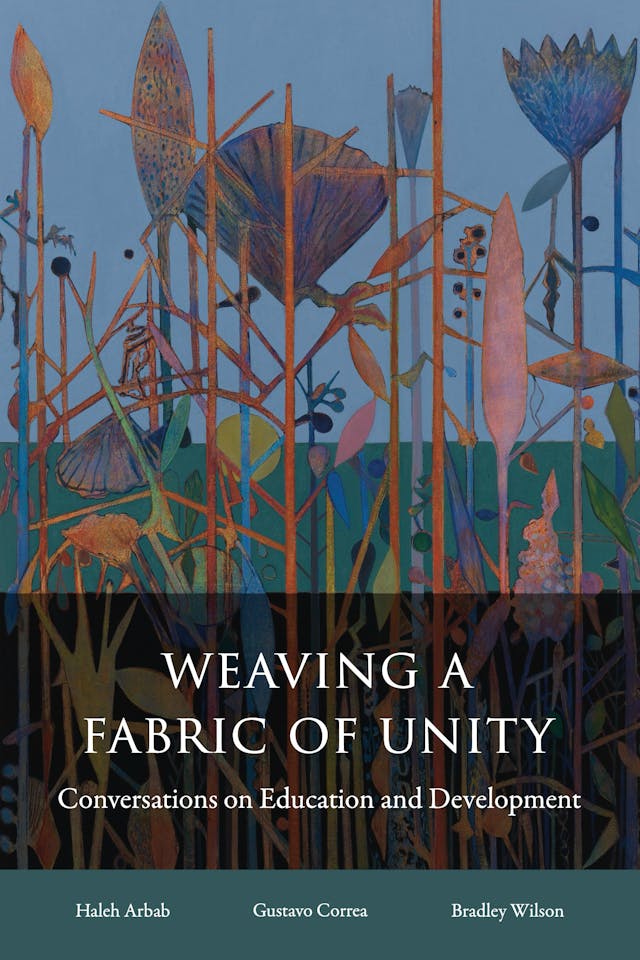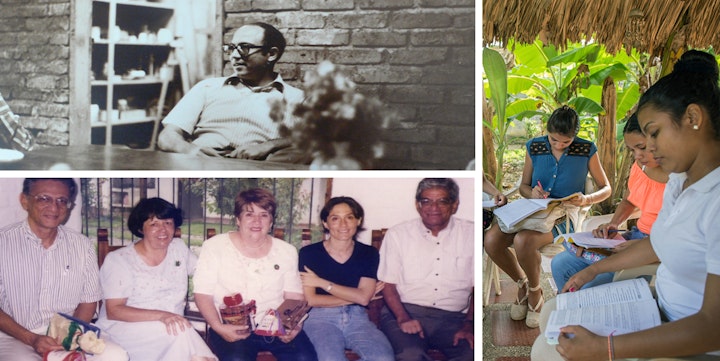Publications

Weaving a Fabric of Unity
The following is an extract from Weaving a Fabric of Unity: Conversations on Education and Development. The book shares the story of the pioneering enterprise that came to be identified as FUNDAEC (the Foundation for the Application and Teaching of Science), highlighting five decades of stories, learning and insight from key individuals central to shaping its evolution.
Learn more about the book“…a 50-year cycle of intergenerational action”

On May 11, 2022, just as many around the world began to emerge from lockdowns, social distancing, and deep reflection on our health and well-being during the years of the global pandemic, a humble gathering of friends, collaborators, and coworkers took place in a small town to the south of Cali, Colombia. Delayed by two years due to the dangers posed by the coronavirus, the gathering had assembled at the Bahá’í House of Worship just a few minutes drive south of Puerto Tejada. The group, arriving by bus, car, bike, and motorcycle, had come to pay their respects to those special souls who had, in the course of their lives, made important contributions, big and small, to the well-being of the people of the rural region in which they called home, Norte del Cauca.
Norte del Cauca is a rural area south of the large metropolitan center of Cali, Colombia. A beautiful, biodiverse, and earthly-rich region of Colombia, Norte del Cauca is one of seven subregions of Cauca, composed of the municipalities of Santander de Quilichao, Buenos Aires, Suárez, Puerto Tejada, Caloto, Guachené, Villarrica, Corinto, Miranda, Padilla, Jambaló, Caldono and Toribio, with a population of nearly 450,000. The people of Norte del Cauca principally trace their ancestry to Afro-Colombian and indigenous lineage whose cultures have shaped the region for centuries. During the last five decades, traditional agriculture and family farming in Norte del Cauca—the principal source of livelihood in the region—has been radically transformed by extensive monoculture sugarcane development inspired by Green Revolution technology, displacing ancestral indigenous and Afro-Colombian agro-ecological production methods. The erosion and fertility loss of traditional farms of the people in the region has led to decades of livelihood insecurity—a generalized vulnerability for families across Norte del Cauca as they seek farmwork, domestic and informal work, or move to find their fortunes in the city of Cali. But, Norte Caucanos are proud of their traditions, and the resilience of their spirit is palpable even through the turmoil they have experienced over centuries past to present.
Upon arrival, the participants walked—some alone and others in pairs—up the paths leading to the Bahá’í House of Worship, where they joined together in prayer and to remember the lives of friends who had passed on. It was, for all, a precious moment long anticipated. It had been more than 45 years since these friends and coworkers first began their journey together in service to the community. Some had been lost along the way but never forgotten. These souls included Farzam Arbab, Alfaro Mina, Aldemar Valencia, Edmundo Gutierrez, Eldanurth Mina, Francineth Castro, Habib Rezvani, Hernan Mena, Javier Marin, Leonardo Laredo, Leonilde Mazabel, and Teofilo Gutierrez. There were tears and smiles, joy and sorrow, heartfelt emotions quietly held in the collective embrace of a silent moment together, sitting side by side, remembering the roads they had walked together and what they had learned along the way. This simple occasion, in many ways, marked the beginning of the end of a 50-year cycle of intergenerational action, reflection, and learning set in motion by the protagonists of FUNDAEC—the globally renowned development institution founded in 1974 by a group of young collaborators in this place, Norte del Cauca.
The most treasured guests attending the gathering included the graduates of FUNDAEC’s first educational programming: its pioneering group of Promoters of Community Well-being—the Ingenieros (the engineers). The Ingenieros, as they are respectfully and affectionately called, were the first young people in Norte del Cauca to answer the call of FUNDAEC and collaborate with and lead action-research teams. They were the first to adopt its research, learning, and action approach in service to the development of their region. Nearly fifty years since they had taken their first steps with FUNDAEC, here on this day, they had returned to honor their alma mater for its profound effects on the region and to reaffirm their commitment to serving and continuing to raise another generation of youth who could carry the mantle of this noble work to which they dedicated their lives.
After the moment of quiet remembrance, the group—composed of generations of collaborators who established the first center of learning created by FUNDAEC—reconvened in a circle in the shade of an open-air veranda surrounded by lush trees. Old friends and new ones mingled and spoke to one another. Young people and elders showed one another great respect. It was there, in that circle in time and space, that Gustavo Correa—the first director of FUNDAEC, appointed and entrusted by its founders to direct the initiative in 1974 at the young age of 27—stood before the group of his former students, now, at 74 years of age. Reminiscent of that moment in 100 Years of Solitude when Ursula realizes that time was not passing but rather turning in a circle, Gustavo, in tones of a loving friend, reminded those assembled of the road they had walked together: the history and origins of FUNDAEC, its key concerns, its central principles, its inspiration, and the urgency of the continued work of strengthening the vision and practice of development in Norte del Cauca. We draw upon his words, as he shared them that day, to set the tone for the book you are reading, to welcome you into the circle of time, and to provide a glimpse into the context for the conversation that will progressively unfold in the pages to follow.

Weaving a Fabric of Unity
The following is an extract from Weaving a Fabric of Unity: Conversations on Education and Development. The book shares the story of the pioneering enterprise that came to be identified as FUNDAEC (the Foundation for the Application and Teaching of Science), highlighting five decades of stories, learning and insight from key individuals central to shaping its evolution.
Learn more about the book